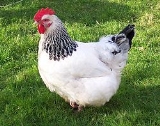
Organic egg production
Encyclopedia

Egg (food)
Eggs are laid by females of many different species, including birds, reptiles, amphibians, and fish, and have probably been eaten by mankind for millennia. Bird and reptile eggs consist of a protective eggshell, albumen , and vitellus , contained within various thin membranes...
through organic
Organic certification
Organic certification is a certification process for producers of organic food and other organic agricultural products. In general, any business directly involved in food production can be certified, including seed suppliers, farmers, [food] processors, retailers and restaurants.Requirements vary...
means. In this process, the poultry are fed organic feed. According to the United States Department of Agriculture, organic means that the laying hens must have access to the outdoors and cannot be raised in cages. Organic egg producers cannot use antibiotics except during an infectious outbreak. Only natural molting can occur within the flock; forced molting
Forced molting
Induced molting is the practice by the commercial egg industry of artificially provoking a complete flock of hens to molt simultaneously. During the molting period, the hens go out of production for a period of at least two weeks. This has the effect of allowing the hen's reproductive tracts to...
is not allowed. Organic certification also requires maintenance of basic animal welfare
Animal welfare
Animal welfare is the physical and psychological well-being of animals.The term animal welfare can also mean human concern for animal welfare or a position in a debate on animal ethics and animal rights...
standards.
Differences between "Free Range" and "Organic"
Significant differences cover feed, medication, and animal welfare. Organic hens are fed organic feed; it is prohibited to feed animal byproducts or GMO crops - which is not disallowed in free range environments; no antibiotics allowed except in emergencies (in free range, it is up to the farmer, but the same levels of antibiotics as conventional farming is allowed); required animal welfare standards in organic farms, which can improve the quality of both the eggs and the meat - low stress levels lead to superior quality of animal products, a fact long known and used in the production of the famous Wagyu beef. Look for labels that say both "Organic" and "Free-Range". Cage free only means that they are not in a cage, but are usually still confined in barns at high population densities.Organic feed
Organic feed is grown by certified organic farmers. To become a certified organic farmer, the crop must be free of genetically modified organisms (GMOs). The crop must be free of GMOGMO
A GMO is a genetically modified organism.GMO may also refer to:* Gell-Mann–Okubo mass formula in particle physics* General Medical Officer, a designation for United States Army soldiers* Generalised molecular orbital theory, in chemistry...
s and synthetic fertilization for three years before it can be certified for organic usage. If the crop is contaminated by cross-fertilization, the crop is rendered useless for organic grading. Finally, there can be no animal by-products fed to the poultry.
Living conditions
In the United States, "organic" egg production means that the flock may not live in cages and must have access to the outdoors. Organic egg producers in the United States do not always grant meaningful outdoor access to their organic laying hens; most industrial-scale organic egg producers generally build small wood or concrete porches attached to the henhouses, which passes as "outdoor access."Antibiotics
Organic egg producers cannot feed low-level antibiotics to the poultry. Antibiotics are only allowed during an outbreak of infection or disease.Molting
Some farms induce molting in their flocks to affect egg production. In organic egg farms, the birds are allowed to go into a natural molt but are not induced.Animal welfare
Similar to all other forms of egg production in the United States, organic production is also regulated by animal welfare audit system. Mistreatment of the chickens could potentially lead a farmer to losing their organic certification. Thus some of the arguments from animal activist organizations that egg production is cruel and inhumane do not necessarily apply to organic raised hens. On the other hand, male chicks who are born on organic or free-range egg farms are still discarded, by the use of lethal gas, because they do not produce eggs. The American Organic Standards still allow beak trimming as a means to lessen injury to the birds.See also
- Organic certificationOrganic certificationOrganic certification is a certification process for producers of organic food and other organic agricultural products. In general, any business directly involved in food production can be certified, including seed suppliers, farmers, [food] processors, retailers and restaurants.Requirements vary...
- Free range eggs
- Free rangeFree rangethumb|250px|Free-range chickens being fed outdoors.Free range is a term which outside of the United States denotes a method of farming husbandry where the animals are allowed to roam freely instead of being contained in any manner. In the United States, USDA regulations apply only to poultry and...
- Pastured poultryPastured poultryPastured poultry is a sustainable agriculture technique that calls for the raising of laying chickens, meat chickens , and/or turkeys on pasture, as opposed to indoor confinement...

